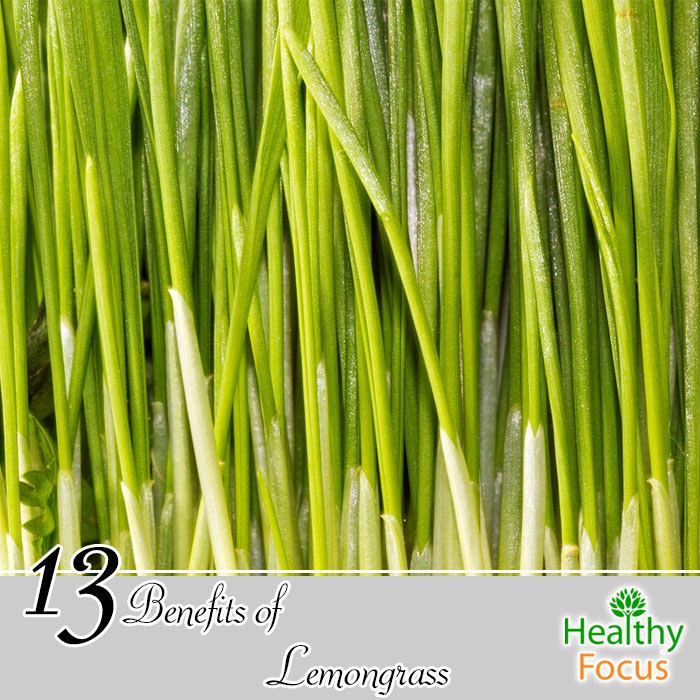Last Updated on April 2, 2017 by Marc Seward
There’s more to lemongrass than it’s sunny, lemony scent and culinary applications. Considered a medicinal herb, lemongrass has numerous health benefits, such as improving digestion and reducing cholesterol. The antibacterial, anti-fungal, and antimicrobial properties have made lemongrass a popular herb in Ayurvedic medicine.
Health Benefits of Lemongrass
Between it’s infection-fighting qualities and it high antioxidant content, as well as its vitamin A, vitamin C, and mineral content, lemongrass has potential provide the mind and body with a number of benefits.
1) Detox
Regularly enjoying a nice cup of lemongrass tea can help cleanse and detoxify the body. Lemongrass tea is considered a natural diuretic and therefore encourages the flow of urine. This will remove toxins, cholesterol, and uric acid from the body. In addition, the increased frequency of urination helps cleanse the kidneys, liver, bladder, and pancreas.
Keeping your body free of toxins is beneficial to your overall health and a great way to protect your body from harmful elements we encounter in our environment, food, and bad habits.
2) Lowers Cholesterol
Another way lemongrass aims to lower cholesterol is due to its anticholesterolemic and antihyperlipidemic properties. Some studies indicate that regularly incorporating lemongrass into your diet balances levels of triglycerides while decreasing levels of LDL cholesterol.
Reducing bad cholesterol prevents plaque from clogging up the arteries and therefore decreases instance of heart attacks and strokes while preventing the development of atherosclerosis.
3) Improves Digestion
First things first, lemongrass creates a healthy environment for the stomach by working as an antibacterial and antimicrobial agent that eliminates harmful bacteria that can cause illness. When the gut is populated with good bacteria, as opposed to bad bacteria, digestion is improved while instances of indigestion, heartburn, flatulence, constipation, vomiting, and diarrhea are decreased. Regularly drink tea to help support healthy digestion.
4) Antioxidants
Loaded with antioxidants, consuming lemongrass protects you at a cellular level. Antioxidants track down harmful free radicals roaming the body and neutralize them, helping to reverse damage done and improving cellular health. This helps to prevent diseases as well as keeps our skin healthy and smooth.
5) Treats Edema
The diuretic nature of lemongrass makes it an effective treatment for edema. Being a natural diuretic, lemongrass prevents the retention of water and therefore reduces swelling.
6) Healthy Skin
A natural astringent, lemongrass is great for treating such skin conditions as acne and effectively helps to dry up excess oil. This quality also helps to reduce the appearance of pores while keeping them free of impurities and blemish-causing gunk.
7) Improve Mood
The sunny scent of lemongrass can help improve your mood and fight mild symptoms of depression. Lemongrass contains citronella, which is known to relax a tense mind. Drinking a cup of lemongrass tea can help you unwind after a stressful or emotionally taxing day.
Those suffering from insomnia due to stress will find that drinking a soothing cup of lemongrass tea before bedtime can help calm frazzled nerves enough to sedate the body and encourage sleep.
8) Reduce Inflammation
A natural anti-inflammatory, drinking lemongrass tea can help reduce inflammation in the body, greatly reducing instances of disease. Drinking lemongrass tea is also an effective way to treat painful joints associated with such inflammatory conditions as arthritis, rheumatism, and gout.
9) Reduce Fever
Lemongrass is considered a febrifuge, meaning it helps to reduce temperature. Lemongrass is common used in Ayurvedic medicine to facilitate sweating and therefore naturally reduce fever.
10) Treat Colds
A source of vitamin C and antioxidants, lemongrass may help uncomfortable symptoms associated with colds, such as nasal blockages, coughs, and congestion.
11) Prevents Infection
Lemongrass is considered an antibacterial and anti-fungal, meaning it helps decrease infection caused by these two invaders. By regularly consuming lemongrass, you may help decrease your chances of developing athlete’s foot, ringworm, yeast infections, and urinary tract infections.
12) Possible Cancer Prevention
The antioxidant quality of lemongrass helps to protect the cells from damage and mutation. Some preliminary studies indicate that lemongrass encourages the death of cancerous cells, however more research is needed to confirm these results.
13) Suppresses Body Odor
You will find that lemongrass is used in many commercial deodorants, fragrances and soap. This is because the antibacterial and anti-fungal activity of lemongrass helps to eliminate body odor. It is recommended to add lemongrass to your foot bath to help prevent both unpleasant foot odor and athlete’s foot.
Using Lemongrass
Lemongrass can be used in a variety of ways. Most health food stores carry dried lemongrass prepackaged in teabags. It can also be added to your cooking in any number of meals.
To make fresh lemongrass tea, boil two stalks on lemongrass in hot water. Steep for five to ten minutes, depending on how strong of a flavor you desire. Lemongrass tea can be sweetened with either sugar or honey. Lemongrass tea can be enjoyed hot or cold.
For topical application, consider using lemongrass essential oil. Be sure to dilute lemongrass essential oil with a carrier oil before applying directly on the skin.
Side Effects and Considerations
Before consuming lemongrass, please consider the following:
- Although lemongrass is considered generally safe, some people may be allergic to lemongrass. If you experience allergy symptoms after consuming lemongrass tea, discontinue use and consult a physician.
- Pregnant women should consult their doctor before using lemongrass.
- Those who are breastfeeding should consult their physician before consuming lemongrass.
- Lemongrass may interfere with some medications, such as drugs from chemotherapy. If you are taking any medication, consult a physician before consuming lemongrass.
- Lemongrass should not be used in place of traditional medicine.
- More rigorous scientific research is needed to back up the claims associated with lemongrass benefits.

Leave a Reply
You must be logged in to post a comment.